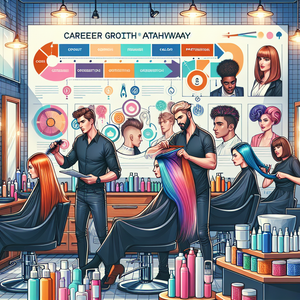
Exploring the Exciting Career Opportunities in Hairstyling: Roles, Responsibilities, and Growth Potential
The hairstyling profession is a vibrant segment of the beauty industry, teeming with diverse career opportunities for those who are passionate about hair and aesthetics. This article delves into various hairstylist roles, ranging from entry-level positions to specialized experts, each offering unique responsibilities and skill requirements. By examining the different paths, from junior stylists who learn the ropes to color specialists who master intricate techniques, this guide aims to provide aspiring hairstylists with insights into job responsibilities, educational prerequisites, current industry trends, and potential career trajectories. Whether your passion lies in creating stunning wedding hairstyles or perfecting the art of color application, this overview will help you navigate the dynamic world of hairstyling.
Job Summaries:
Junior Hairstylist:
- The journey often begins as a Junior Hairstylist.
- Individuals perform essential salon tasks like washing, conditioning, and blow-drying hair while assisting more experienced stylists.
- They may also undertake basic haircutting, all under careful supervision.
- A high school diploma and a cosmetology license set the stage for this foundational role.
- This role is critical for hands-on experience.
- Many successful stylists share that this entry-level position laid the groundwork for their careers.
- It provides them with an appreciation for the artistry of hairstyling.
Hair Color Specialist:
- Hair Color Specialists focus solely on the art of coloring hair.
- Employ techniques such as balayage and ombre to achieve stunning results.
- Engage with clients to understand their desired outcomes.
- Mixing and applying dyes with precision is essential.
- A solid understanding of color theory is vital.
- A cosmetology license is required.
- Additional certifications in coloring techniques are important.
- There is a growing trend towards personalized and innovative hair color.
- The demand for these specialists is on the rise.
Senior Hairstylist:
- Senior Hairstylists offer a wide range of services, including cutting, coloring, and styling hair.
- With years of experience, they often serve as mentors for junior stylists.
- They play a crucial role in fostering strong client relationships.
- A cosmetology license and several years of industry experience are essential for this role.
- Senior stylists enhance the salon's reputation.
- They contribute significantly to client satisfaction.
- Senior stylists often share their personal experiences and favorite techniques with newcomers.
Salon Manager:
- The Salon Manager is the backbone of daily operations.
- Ensures that everything runs smoothly and that clients leave satisfied.
- Responsibilities include staff scheduling, inventory management, and resolving customer complaints.
- Strong leadership and communication skills are essential.
- Experience in the beauty industry is often gained through prior roles as a stylist or receptionist.
- A cosmetology license can further enhance a manager's understanding of the services offered.
- Allows for more informed decision-making.
Bridal Hairstylist:
- Specializing in creating stunning hairstyles for weddings
- Bridal Hairstylists consult with clients to design looks that align with their personal styles and wedding themes
- This role requires the ability to work well under pressure and exceptional interpersonal skills
- Continuous education through workshops helps these professionals stay updated on the latest trends in bridal hairstyling
- Stories abound of how a bridal hairstylist's work can make a couple's special day even more magical
- Showcasing the personal connections built through this niche.
Hair Extension Specialist:
- Hair Extension Specialists enhance clients’ hairstyles by expertly applying and maintaining hair extensions for added length and volume.
- Knowledge of different extension types and application techniques is crucial.
- The ability to communicate effectively with clients about their preferences is important.
- Certification in hair extensions can be an asset.
- There is an increasing demand for this specialized service.
- Many clients seek to transform their looks dramatically.
Men's Hairstylist:
- Men's Hairstylists focus on grooming services tailored to male clientele, including haircuts and beard grooming.
- Mastery of various cutting techniques and awareness of current trends are essential for success in this role.
- A cosmetology license and knowledge of barbering techniques are typically required.
- As men’s grooming continues to gain popularity, this role is becoming increasingly prominent in the industry.
Barber:
- Barbers offer specialized services like haircutting and shaving, primarily for male clients.
- They excel in techniques specific to male hairstyles and build long-term client relationships based on trust and expertise.
- Completing a barbering program and obtaining the necessary licensing are standard requirements.
- Barbers play a vital role in meeting grooming needs and fostering community engagement, often sharing anecdotes from their daily interactions.
Creative Director:
- The Creative Director shapes the artistic vision and branding of a salon.
- Works closely with stylists to develop signature styles and cohesive marketing strategies.
- A robust background in hairstyling combined with management or marketing experience is essential for this role.
- Creative Directors are instrumental in defining the salon’s identity and attracting clientele.
- Often drawing on their own journey within the industry to inspire others.
Educator or Trainer:
- Educators or Trainers are pivotal in shaping the next generation of hairstylists.
- They create training programs, host workshops, and provide hands-on demonstrations.
- They ensure that staff are up-to-date with the latest techniques and products.
- A deep understanding of hairstyling, paired with exceptional communication skills, is critical for success in this role.
- Many educators have extensive industry experience and hold certifications in specific techniques.
- They share their insights and passion for hairstyling with their students.
The multifaceted world of hairstyling presents an array of career opportunities for those eager to explore hair care and styling. Each role plays a significant part in enhancing client experiences and the overall success of salons. Aspiring hairstylists are encouraged to investigate current job openings and consider how their own skills and interests align with the various opportunities in this vibrant field. By understanding the specific responsibilities and requirements of each position, individuals can confidently navigate their career journey in the dynamic world of hairstyling, ultimately finding their niche in this rewarding profession.
Explore More Jobs

